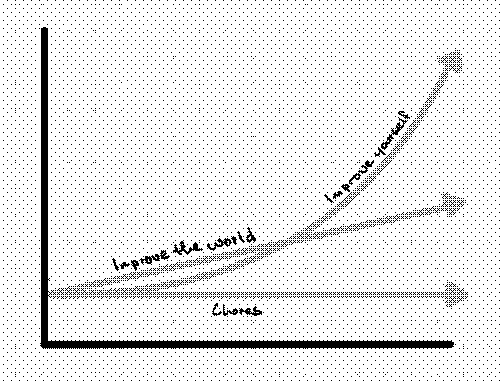Notes > How to Spend Time
Broadly, three categories of productive activities:
- Chores – things you have to do to maintain stasis.
- Improving the world – not in some grand sense necessarily, but activities that create lasting improvement: building things, fixing things, getting rid of things.
- Improving yourself – things you do to make you better at doing other things.
Book smarts, street smarts. Learning by study, learning by doing. Read about it, apply it, see it in action, take that practical experience back to your reading, deepen your understanding, take that deeper understanding back to your activity … it’s a never-ending cycle, each aspect of learning feeding the other.
Information becomes knowledge – personal, embodied, verified – only when we put it to use … Creating new things is not only one of the most deeply fulfilling things we can do, it can also have a positive impact on others – by inspiring, entertaining, or educating them.

(This would imply that “improving yourself” is the most valuable use of time, but I actually think it’s something like the opposite.)
Experiences:
- Routine
- Novel
Leisure:
- Most of my hobbies are hard (satisfying but somewhat stressful)
- I don’t really have leisure activities besides reading fiction
- I spend a lot of time mindlessly scrolling my phone
- What do I love to do that is relaxing & that I don’t feel a constant need to improve at?
- Spend Exactly None Of Your Time Killing Time
- Rapt, p. 108
Sleep:
- Getting 7+ hours is important. It can feel like a waste of time when it’s 11:30 and you’re on a roll, but an extra hour of sleep can mean the difference between a good day and a bad one.
- If you’re tired mid-day, just take a nap.
Napping makes you smarter. Seriously. Lots of studies show napping improves alertness and cognitive performance in the af noon. As usual, we’ve tested the science ourselves.
You don’t even have to fall asleep. Just lying down and resting for ten to twenty minutes can be a great way to recharge.
– Make Time (p. 232-233)
References
- “What Do You Want to Make Real in the World? — Anna Havron”; backed up 2023-04-30 03:38:36 UTC
- “Sunday Firesides: To-Dos, the Rent We Pay For Living | The Art of Manliness”; backed up 2023-04-30 03:43:27 UTC
- “How to Slow Down Time | Valet.”; backed up 2023-07-05 16:08:47 UTC
- “Spend Exactly None Of Your Time Killing Time”; backed up 2023-04-30 03:40:23 UTC